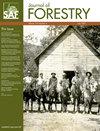在选择管理下,简化的树木标记准则提高了北方阔叶林的价值恢复和林分活力
IF 3.2
2区 农林科学
Q1 FORESTRY
引用次数: 0
摘要
在北方阔叶林中,树木标记员在伐木作业中使用分类系统选择要采伐的树木,该分类系统根据存在的各种个体缺陷分配采伐优先级。根据我们对缺陷对树木活力(死亡或生长下降的风险)和质量(恢复有价值的锯木的潜力)的影响的理解的最新进展,树木标记应该采用比当前操作实践更简单的分类系统,考虑更少的缺陷,并且他们应该优先清除树冠枯死的树木。由于出现缺陷和死亡的可能性随着树木直径的增加而大幅增加,树木标记也应该倾向于移除保持其质量的较大树木。然而,这些建议是基于树级分析提出的。为了在林分尺度上提供进一步的验证,我们比较了三种树木标记制度下的林分改善和价值恢复:一种基于上述建议的新的简化制度,以及加拿大魁北克省使用的两种制度。为此,我们对分布在魁北克北部阔叶林区的14个管理林分进行了树木标记模拟和价值恢复评估。我们的研究结果证实,简化的树木标记制度不仅通过去除更大比例的低活力树木促进了林分的改善,而且在林分尺度上恢复了更多的价值(平均17%)。通过优先清除树冠枯死的树木,简化制度更有利于在低活力树木死亡或质量下降之前挽救其当前价值。基于我们的研究结果,我们提出了简化和经验验证的北方阔叶林树木标记指南。本文章由计算机程序翻译,如有差异,请以英文原文为准。
Simplified tree marking guidelines enhance value recovery as well as stand vigour in northern hardwood forests under selection management
Abstract In northern hardwood forests, tree markers select the trees to be harvested during logging operations using classification systems that assign harvest priorities based on the presence of a wide range of individual defects. According to the most recent advances in our understanding of the impact of defects on both tree vigour (the risk of mortality or decline in growth) and quality (the potential for recovering valuable sawlogs), tree markers should adopt a simpler classification system that considers fewer defects than the current operational practice, and they should prioritize the removal of trees with crown dieback. Since the probability of developing defects and dying increases substantially with tree diameter, tree markers should also favour the removal of larger trees that have maintained their quality. However, these recommendations were developed based on tree-level analyses. To provide further validation at the stand scale, we compared stand improvement and value recovery under three tree marking regimes: a new, simplified regime based on the recommendations above, and two regimes used in the province of Quebec, Canada. To do so, we conducted tree marking simulations and value recovery assessments in 14 managed stands distributed across the northern hardwood range of Quebec. Our results confirmed that the simplified tree marking regime not only facilitated stand improvement by removing a greater proportion of low-vigour trees, but also recovered significantly more value (17% on average) at the stand scale. By prioritizing the removal of trees with crown dieback, the simplified regime was superior at salvaging the current value of low-vigour trees before they die or decline in quality. Based on our results, we propose simplified and empirically-validated tree marking guidelines for northern hardwood forests.
求助全文
通过发布文献求助,成功后即可免费获取论文全文。
去求助
来源期刊

Forestry
农林科学-林学
CiteScore
6.70
自引率
7.10%
发文量
47
审稿时长
12-24 weeks
期刊介绍:
The journal is inclusive of all subjects, geographical zones and study locations, including trees in urban environments, plantations and natural forests. We welcome papers that consider economic, environmental and social factors and, in particular, studies that take an integrated approach to sustainable management. In considering suitability for publication, attention is given to the originality of contributions and their likely impact on policy and practice, as well as their contribution to the development of knowledge.
Special Issues - each year one edition of Forestry will be a Special Issue and will focus on one subject in detail; this will usually be by publication of the proceedings of an international meeting.
 求助内容:
求助内容: 应助结果提醒方式:
应助结果提醒方式:


